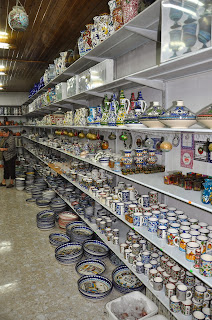The moon was brilliant tonight, then clouds rolled in and we expected rain, but it didn't come. In a good year, the rains would have started early this month and the skies would open in December and continue through February. Khitam and everyone else hopes they start in the next couple of weeks.
We drove into Jerusalem mid-morning, Khitam, her husband Ahmad and I, first to let Ahmad off for some business, then to an athletic club where I got a cappuccino and read while Khitam swam for an hour. She has some trouble with her back and swims as often as she can. While I read outside the club after finishing my coffee, two moms came out with their boys, I'm guessing 2 and 4. The boys were having a great time running around, and when the two-year-old discovered me, he came over to visit, then left, returned, left, returned, each visit a little longer and more engaged that the previous one. We were soon old friends which gave him license to rest his popsicle on my sleeve, give me leaves and more leaves and more leaves, pull my shirt, give me more leaves. Eventually the four-year-old caught on and joined in. They were fun, but my shirt was about to turn into a greasy towel used as a handkerchief for runny noses when one of the moms came over and hustled them off. I'm hoping the shirt will hold up until Tuesday, when I leave; I didn't overpack.
Khitam emerged, refreshed and smiling with supple back. We drove into East Jerusalem, found Cotton sitting in Moe's, his favorite lunch spot, with a friend and the Dean of St. Paul's College - I think it's St. Paul's - an Episcopal college in East Jerusalem. The dean left soon after we got there, not, I hope, because we had arrived, and the four of us talked for a while about the need and difficulty of conveying a fair picture of the Palestinian side of the Israel - Palestine debacle. If people visit, they can see and hear what is going on here. After being here, they can return to the States and tell others what they've seen and experienced. It's like the Peace Corps: more often than not, the real value of the Peace Corps is what it teaches us and our willingness and ability to share it with others. So it is with visitors to Palestine.
After a long talk about the frustrations of trying to convey more of the story of Palestine and Israel, we said our good-byes and headed south for Hebron, which Palestinians call Khalil. Passing through Bethlehem and its checkpoint, we saw Aida Camp, where Abdalfattah's Alrowwad (Pioneers for Life) is located, and Dhaishi Camp, where Khitam and I heard the Palestinian Orchestra from the Edward Said Conservatory play in April, then on to Khalil and the Natsheh family's pottery and glass factory, a hands-on family business that has been in the family for 300 years, according to Muosa, a fifteen or sixteen year-old member of the family who told us about the work, demonstrated the pottery painting and showed us some finished pottery still in the kiln after having been fired twice. He showed us around and pointed out a photo of Jimmy Carter's visit to the operation. The hand-painted pottery is beautiful and varied, with everything from small dishes for olives or peanuts to large casseroles, tea pots, serving dishes and more.
We drove to Nasser's village which is between Bethlehem and Jerusalem, up in the hills. From Nasser's new apartment in a two or three story building - it was dark - that his family owns and lives in, we could see the lights of Jerusalem flickering about fifteen miles away. The road to the village is winding and narrow because it's in Palestinian territory on "the other side of the wall." Later, as we drove toward Jerusalem, we could see "their highway" on the other side of a fence. Eventually, we were able to get onto it, closer to Jerusalem and two checkpoints from Adahya, where Khitam lives.
 |
| Muosa, his brother and a kiln full of cooling pottery |
 |
| Magda & mahloubi |
We drove home without much traffic. On the way to Khalil, traffic had been bumper to bumper until we got to Bethlehem on a Friday when usually there is very little traffic, Khitam said. Remember, there are three active religions here: Islam, with a sabbath on Friday; Judaism, with a sabbath on Saturday; and Christianity, with a sabbath on Sunday. This means for some, the weekend is Friday and Saturday; for some, it's Saturday and Sunday; for some, it's Friday and Sunday. If the heads of mosque, temple and church could get together, there would be a lot of common holidays to forward to!
 |
| Mohamed, Nasser, Malik, Monteser, Magda, Amna, Muath |

No comments:
Post a Comment